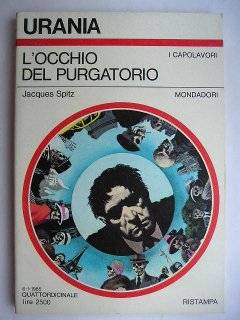
The novel “The Eye of Purgatory” (“L’Oeil du Purgatoire”) by Jacques Spitz was published for the first time in 1945. It was translated by Brian Stableford and published in anglo-saxon countries in 2010.
Jean Poldonski is a painter who one day meets Christian Dagerlöff, a scientist who claims to be a professional genius. Intrigued, Poldonski listens to his stories for a while but soon gets bored. Things are going badly for him, so much that he thinks about suicide one day when he has a severe headache. Dagerlöff gives him a medicine he produced and actually the day after Poldonski feels better and gives up his purpose.
In the following days Poldonski starts seeing strange things around him: the water is dirty, the food is rotten, the newspapers are spoiled and so on. When he compares what he sees with someone else however he discovers that only he can see things out of the ordinary. Poldonski initially thinks he has developed a problem with his sight or that he’s even crazy but over time he realizes that the medicine given by Dagerlöff changed his sense of sight in a profound way. Poldonski sees everything around him the way it will be in the future and day by day that future becomes more and more distant but what will he see in a future in which everything has turned into dust?
“The Eye of Purgatory” is the masterpiece of Jacques Spitz, a French writer little known even in his country, an engineer who started writing for passion but with limited success.
In “The Eye of Purgatory” we can see Jacques Spitz’s main elements: cynicism, irony and pessimism. The novel is narrated in the first person from the perspective of Jean Poldonski, a painter who thinks he’s very good but with little will to work. A chance encounter with scientist Christian Dagerlöff makes him the guinea pig in an experiment that alters his sight when a kind of bacterium starts multiplying in his eyes making him see all the things around him as they will appear in the future. Spitz provides a scientific basis for his novel but what he’s really interested in is the protagonist’s inner journey.
Poldonski had a disenchanted vision of the world when his sight was normal, when he starts seeing how people will appear in the future he can’t help laughing because to him they look like homeless people, wearing shabby old clothes when in fact maybe they are dressed very elegantly wearing brand new clothes. Poldonski is a rather superficial man yet he realizes that now he can see people beyond appearance and can judge them for who they really are and not for their expensive clothes.
For Poldonski that’s just the beginning of his journey in the decadence of the surrounding world. When he started seeing how people would look in the future, only rarely he saw someone looking like a corpse. With each passing day however Poldonski sees them in a farther and farther future so the amount of people he sees as corpses keeps on increasing. The living become older and older and this makes his relationships difficult, in particular with his girlfriend, to which however he never had very romantic attentions. There comes a time when Poldonski sees even himself as a corpse.
In the early days after he realized what was happening, Poldonski tries to ignore the inconsistencies between what he sees and reality, even if it’s not easy to eat food that appears spoiled. For a while he takes photographs to try to stay grounded in reality because they look old but the impressed objects appear to him as they really are. However, when he starts seeing almost everybody as rotting corpses and then as skeletons, Poldonski goes through the most gruesome stage of his journey in the decadence of the surrounding world. For him it becomes more and more difficult to recognize the people he meets: he wasn’t a social person before and in time he becomes even more isolated.
When Poldonski sees the world as it appears in a future so far that everything has turned into dust, the last and more metaphysical phase of his journey starts. At that point he can clearly see almost only forms that show people’s thoughts and emotions. When the stars starts disappearing and the Sun turns pale, Poldonski is persecuted by the last form he can discern until he has the shocking revelation that allows him to understand its origin.
“The Eye of Purgatory” explores the inner space decades before the “New Wave”. This novel is a little more than a hundred pages long so the plot has a fast pace in which inevitably Jean Poldonski is the only character really developed. It has a cynical and ironic vision of humanity and it’s almost splatter in the central part where the protagonist sees himself surrounded by corpses. The English translation includes the novel “The Experiment of Dr. Mops” (“L’Expérience du Dr. Mops”), another novel by Jacques Spitz translated by Brian Stableford. It’s a lesser novel so “The Eye of Purgatory” is the really good novel in the book. It’s an uncompromising novel and that’s why it’s worth reading it.

